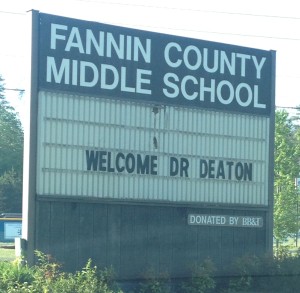 Last week I did presentations on history in three middle schools in three different Georgia counties, Gwinnett and Walton in metro Atlanta and Fannin in North Georgia. Two of the programs were for 8th graders and one for 6th graders.
Last week I did presentations on history in three middle schools in three different Georgia counties, Gwinnett and Walton in metro Atlanta and Fannin in North Georgia. Two of the programs were for 8th graders and one for 6th graders.
I’ve been doing public speaking since I first started this job nearly 16 years ago, and standing in front of an audience to talk about history is about as natural for me now as breathing. But I think I’d rather stand up in front of a hundred federal court judges than a hundred 8th graders. It’s a tough age and they can be a tough audience. Acting jaded, cynical, and uninterested is a badge of honor.
And of course it’s become a rite of passage for adults to bemoan teenagers in this or any age for what they don’t know, don’t care about, or even care to know what they don’t know. The world is going to hell in the proverbial handbasket, and the younger generation is always leading the charge. It’s the declension theory of civilization—it was better in the past, people worked harder, valued things (education, manners, work ethic, etc.) more than they do now, and cared passionately about and understood the value of getting a good education. Kids these days are just entitled lazy brats.
Adults have been saying that about the rising generation for millennia. It was said of our Founders and of the folks we now call the Greatest Generation. Today’s teenagers will say it about their own kids.
One might assume that as a professional historian, I would routinely engage in this kind of hand-wringing. But the truth is, after visiting with these students last week, I was very pleasantly surprised.
They knew a lot more about history than I thought they would for people who were born in 2002. Even the 6th graders were familiar with things like D-Day and the Civil Rights movement that I didn’t think they’d know a lot about. What’s more, many of them were not only familiar with history, they were actually very interested in it and weren’t afraid to show that interest, even in front of their peers. I came away impressed with these students and their teachers.
I was particularly impressed with a 12-year-old boy in Fannin County named Mike. You might not notice Mike otherwise as he was a little small for his age (as I was in 6th grade). But Mike was well-behaved, interested, smart, and he asked great questions.
And I’m drawn to people who ask questions, who are naturally curious about the world around them, and how the world go to be the way it is. At one point I told the students that in my estimation the greatest gift anyone can have is a natural curiosity; armed with that, you’ll never stop learning as you go through life and it will enrich your journey in ways you can’t imagine.
Mike had that in spades. He raised his hand so many times (in a gym assembly of over 100 kids) to ask a question that I finally had to ask him to give others a turn. He came up to me afterwards to ask more questions and to tell me that like me, and like Thomas Jefferson, whom I also talked about, he loved books and loved to read.
Of all the kids I met last week, the little boy in Fannin County with the tousled hair and wearing the plain white t-shirt impressed me most. I told him before I left that I thought he was going places, that he would do great things with his life. His eyes lit up. “Really?” he said, beaming at me. “You think so?” Really Mike. Yes I do. Keep reading, keep learning, and most of all keep asking questions. One day, you’ll be the one standing up in front of a crowd, talking about something that you love.
There’s an old saying, “the world steps aside to let any man pass who knows where he’s going.” I think there’s a young boy in the Blue Ridge Mountains of North Georgia who will make the world step aside one day.
I got a glimpse of the future last week, and it didn’t scare me at all. It smiled back at me and promised great things. The future is in better hands than we think.
